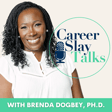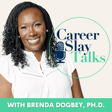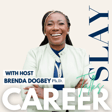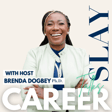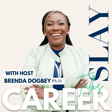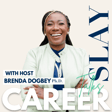Become a Creator today!Start creating today - Share your story with the world!
Start for free
00:00:00
00:00:01

009: Pivoting from dental dreams to public health with Dr. Anna Ampaw
In this inspiring episode, Career Slay Talks with Dr. Anna Ampaw who shares her story derailed dental dreams to doctoral Heights." In today's journey, we'll delve into a remarkable story of resilience and transformation as we follow Anna's path from facing the disappointment of dental school rejection to achieving the impressive milestone of a Public Health PhD and forming her own NGO. Join us as we explore the twists, turns, and triumphs that shaped this incredible voyage of personal and academic growth.
Transcript
Finding Fulfillment in the PhD Journey
00:00:00
Speaker
And it wasn't until I was in my PhD where I was like, this is where I'm supposed to go. I actually had peace with where I was. I wasn't thinking about my dental school rejections or what my friends were doing. But I was like, you know what? This is actually fulfilling.
00:00:17
Speaker
I think what also fulfilled me as well was being that face that I didn't have. I remember doing my PhD, I would TA sometimes and I would have black students in my group and they would be like, oh my god.
00:00:32
Speaker
I know. They're like, did you have your PhD? What? And it's just like, I love that because I wish I had someone there to put a face to where I could be like, oh, wow, PhD is actually something that I could probably do.
Introducing Dr. Anna Ampaw
00:00:48
Speaker
Hello, everyone, and welcome to another episode of the Korea Slay Talks podcast. I'm Brenda Dogbay, also known as the Korea Slay Mala.
00:00:56
Speaker
And today I'm speaking with Dr. Anna Ampau, who is a provost postdoc fellow at the University of Toronto in Mississauga, Canada, where her research on contributing to the oncology drug discovery pipeline by designing and chemically synthesizing small molecule drug leads for rare cancers.
00:01:21
Speaker
She is a powerhouse. She's also a two times alumni from the University of Ottawa where she obtained her bachelor's and her doctoral degree.
00:01:30
Speaker
And apart from her research, Anna is also very passionate about encouraging women of color to pursue STEM careers and is doing so by publicly advocating for women of color through social media and other media
Anna's Unexpected Path to STEM
00:01:44
Speaker
venues. And she's also the founder and executive director of the nonprofit organization Empowering
00:01:51
Speaker
female minds in STEM, eFEMS, if I'm saying it correctly. This is an organization that equips women in the continent of Africa with the skills and resources they need to thrive in their STEM careers. So I was so excited to speak with Anna because again, just from her bio, you can hear of all the, you know, we've got a lot in common in terms of STEM background,
00:02:17
Speaker
health background and PhDs, right? So I thought I'd have a bit of a conversation with her today about your journey. Can you just share with us how you came about, say, your journey from, say, undergrad to PhD?
00:02:34
Speaker
Yes, so first of all, thank you so much for having me on the Career Slate podcast. Very happy to be here. And yeah, I'll maybe explain a little bit about how I ended up where I am today. Because if you asked me 10 years from now, this was not the plan at all. It was absolutely not the plan. So initially, when I was in high school, I think in high school, everyone just tries to figure out what they want to do in life. Where they want to go.
00:03:03
Speaker
Exactly. Because you have to make a huge decision of what university you want to go to, what program you want to apply to. And so that's kind of the situation that I was in where I kind of knew what I liked. I just kind of
00:03:17
Speaker
went with the flow, I guess, when it came to just education and just kind of gravitated towards the things that I liked, which was science at that time. So I knew that science was an interest to me, but I didn't really know what you could do with science. The only thing that I knew and I think this was just from my parents was that, you know, you can be a doctor, you can be a dentist, like one of those professions.
00:03:40
Speaker
And so I went into undergrad thinking that I wanted to be a dentist. And I wanted to have this weird obsession with teeth. I would research about oral hygiene and teeth and all this kind of stuff. And I was like, OK, you know what? I think being a dentist is a good job. It's 9 to 5. You get paid very well. And it's probably not that hard to get in compared to med school. So let me just strive for that.
00:04:08
Speaker
So went through undergrad, did really well in terms of grades. I went to University of Ottawa. I took the biopharmaceutical science program, which I personally loved because it was a nice mix between chemistry and biology. And I liked both at that time. And so did the program, did fairly well. In my third year, that's when I was like, okay, let me
00:04:32
Speaker
start to think of, you know, my application to dental school. So I took the DAT, which is the entry test for dental school, similar to the MCAT. I took it, I did decent, not the best, but I thought it was still pretty well. I did pretty well. And then I applied in my third year. When I applied to all the schools in Canada, I heard nothing, like absolutely nothing back. I was like, okay.
00:04:56
Speaker
It's probably more competitive than I thought, but you know what? It's okay. I'm still in third year. Let me just finish my degree in fourth year, bump up my grades, do the DAT again, and that's exactly what I did. I applied after my fourth year. Same thing, did really well on the DAT. Applied to all the schools in Canada and absolutely nothing. No interviews, no callbacks, no emails, nothing.
00:05:23
Speaker
So I was sitting there, graduated. I'm now a graduate of biopharmaceutical science. I'm like, what am I going to do with this degree? What can I do? Because again, I didn't know what you could do with a science degree. And so I was sitting there at the summer after undergrad, wasn't working, didn't really know if I wanted to work in that field. So I was just contemplating, what am I going to do with
Discovering Research and Career Fulfillment
00:05:51
Speaker
my life?
00:05:51
Speaker
after talking to a family friend, he was like, you know, why don't you do a master's that will better your chances to get into dental school? Like, that's a brilliant idea. Let me do a master's. Let me just go into research. Right. And so at that time, I really liked chemistry and specifically organic chemistry. And it was always my highest grades when it came to
00:06:14
Speaker
I know you're making that face because everyone's like... Organic chemistry? So you loved organic chemistry? Yes, I loved organic chemistry. It was always my highest mark. That's funny because I actually, I think I failed organic chemistry the first time I had to redo it and oh my goodness. But anyway, so organic chemistry. So you go over and you're doing this master's program.
00:06:39
Speaker
Yes, master's at Dalhousie University in organic chemistry. And that's when I first realized that you could do research as a career before I had absolutely no idea. And I think it's just because I didn't know anyone that was doing it in terms of our family friends and the people that
00:06:58
Speaker
were in my circle or my family's circle, no one had like, or no one was doing research in science. So to like see that, that was like eye opening to me because I was like, I didn't know that would be something that could be possible. Yeah, I didn't know it was a possibility at all.
00:07:15
Speaker
And so doing my master's, I was like, okay, this is not bad. Like it's interesting. You know, I like, um, I like researching because you can actually add to a field, you know, you're not just studying a field, but you can add your contribution. So I was like, this is kind of cool. Um, but I still had dental school in mind. So even though I was interested in it, I was like, I'm only here just to get into dental school. That's it.
00:07:42
Speaker
as my one job. That's kind of like me with my master's because I was I wanted to do medicine and failed organic chemistry and a couple other courses so I was like I need a back door into medicine and I was like okay I didn't want to do science like pure science for reasons almost opposite is yours and I ended up um
00:08:04
Speaker
going for public health, because in that time, this was just post SARS, I'm dating myself, but this was just after SARS, just the same with this pandemic, where there was a lot of conversation around all the different, you know, there was a lot of interest in investing in public health. And that's how I ultimately ended up going into public health. And I was like,
00:08:26
Speaker
actually a neat field, so I ended up staying. So that's quite fascinating from your end. Exactly. Yeah. It's fascinating how we just kind of stumble upon this and we realize it's actually interesting, you know. So yeah, like I finished my master's, did really well, published a paper, my first author paper, my master's.
00:08:44
Speaker
Yeah. And I applied for dental school again. So I did the DAT. This time I did really well. Like my scores were very competitive. My master's were good as well. Okay. I applied, same thing, all the schools in Canada, absolutely nothing. Wow.
00:09:02
Speaker
Yeah, so at that time, that was really disheartening for me because it was a dream and a goal that I had and I couldn't reach that goal. Fulfill it. Fulfill it, exactly. But now looking back, I realized that that was in the door that I was supposed to walk through. I think that's why that door remained closed.
00:09:22
Speaker
Not to say that dental school isn't difficult to get into, it is. But I know a lot of people that were successful in getting into dental school and becoming amazing dentists. But I just don't think that's the path that God had for me. I think that's why. It was a redirection. It was a redirection, exactly. Yeah. So, you know, after that last time of applying, I'm like, you know, that's the last time I'm going to have to find something else to do.
00:09:50
Speaker
It's amazing because we had very similar stories as far as medicine was concerned. Because I was always like medicine from when I think I was 12. And I'm like, medicine, medicine, medicine. All roads were leading to medicine. And then I applied, I think, two, three times. And I remember the last time I applied it was to McMaster because they had a bit of a non-traditional program. And I was basically like, if I don't get in this time, I'm burying this dream.
00:10:18
Speaker
And it's good. And I'll be fine in my life if I don't do that. And it's the same thing that it ended up being a redirection. And I, in retrospect, I'd have made a horrible doctor. Yes, you know, you look back and I'm like, I like my sleep. I kind of burnt out my blood. And at that time, I'd really built up my, you know, when you're all in invested in a dream, you're all in. But after the fact, I was like, yeah, that would have been a bad idea.
00:10:47
Speaker
No, definitely. And I think it's very important to be able to pivot as well. And I think that's something that we both did where it's like, we put our all in this, we really tried, but it's just not for us. So we're going to have to pivot into something else and leave that behind and try to reach something else, which I don't think is a failure. I don't count it as a failure at all. I just think it's a change in direction.
00:11:14
Speaker
That's all. Absolutely. So you're like, okay, by dental school, did you had you thought of PhD at this point in time or no? No, so I was just happy with the masters. I was like, this is huge. Like I have a master's in chemistry. I'm good. Yeah.
00:11:30
Speaker
And you would think that you're good to apply places and get jobs. And so that's what I was doing. I was applying to places. But then again, I still didn't really know what you could do with a master's in chemistry. So even when I was applying, I didn't even really know where to apply to. I was applying as maybe just a research scientist or formulation scientist, that kind of thing. But I didn't know that there were other options for me at that time.
00:11:59
Speaker
So when I was applying, I got I think maybe like one interview or something, but everything else, I didn't really hear anything back. So after my master's, I moved back home to Ottawa, which is where my parents are.
00:12:15
Speaker
And I started teaching piano and I worked at Starbucks and tutoring. And so, yeah, and so that's what I was kind of doing just to make money at that time and just trying to figure out what I wanted to do. And I did that for about seven months after I completed my master's. And there was one day where I was on campus, so my undergraduate campus, because I was tutoring a student.
00:12:39
Speaker
And I went to go see a professor that I did co-op with in undergrad just to just say hi, because I was to reconnect with him. So I went to his office. We chatted. He was just like, oh, like, what are you up to? And I'm like, nothing really. You know, and he was like, well, you know, you were a great student. I have an opening as a for a PhD student. I would be happy to have you in my lab.
00:13:07
Speaker
I told him I would think about it because I'm like PhD. First of all, I don't know anyone doing a PhD in science. Interesting. That's like four years of your life. At least.
Seizing Unexpected Opportunities
00:13:21
Speaker
Do I want to make that with other commitments? Yeah.
00:13:25
Speaker
So I went home, I thought about it. Obviously, I told my parents, they're like, yeah, PhD. They're like school and more school, right? They were like all for it. And so after thinking about it, I'm like, you know what, I'm not doing anything else, at least with a PhD that will keep myself busy and will give me more opportunities afterwards.
00:13:46
Speaker
This is so amazing, because that's literally exactly how I got into my PhD program. So for me, I was done masters, then I had a year contract in government, which I did. But this was during that recession, 2008 recession. So then after that, no jobs, I couldn't get anything, did some odd things here and there, post masters. And then I'm like, single, no husband, no kids. Yeah. Let's do more school. And so.
00:14:16
Speaker
I think it was somebody too who I'd met through my master's program who we chatted and she was like, I'm doing research, come and do a PhD. I was like, well, okay. So that's so fascinating. Yeah, stories are so similar.
00:14:33
Speaker
Yeah, so you're like, Okay, fine. My piano. Hello, PhD. Exactly. Yeah. And I just want to pause here and just say that if you notice with my story, like, I really put in the minimum effort in terms of applying to masters and PhD, like, for my masters, I applied in August.
00:14:52
Speaker
Okay. For September programs. Yeah. And typically for masters, you apply latest January, February. True. So I applied September or August and I emailed the prof. I applied to the school and within a month I was in and I flew over to Nova Scotia. Right. My PhD, I didn't even apply. It was a conversation that got me in.
00:15:17
Speaker
You have to do the bare minimum. And so that just shows that whatever is for you is actually for you. I know. You're so right about that. For me, when I was doing my master's, I wanted to actually go to the UK. So I did not apply to Canadian schools because I'm like, I'm not saying I was an international student at the time. I'm like, I'm not staying here. Just to guarantee that, I'm just not going to apply. Every single school I applied to turned me down.
00:15:46
Speaker
And I was like, and the funny thing, so I was in global health and the reason they turned me down was that I did not have global health experience. I'm like, dude, born and raised in Kenya, like use the system, the health system that we're trying to fix here and I don't have experience. So that really left us our taste. And then I was trying to figure myself out and I met one of my profs and she was like, hey, there's this new public health program at Simon Fraser. And I was like, yeah, no, not interested. I'm leaving Canada.
00:16:15
Speaker
But then that was before I got the rejections. And after getting all the rejections, I'm like, about that program? Is there? So and that was the one school I applied to got in and same thing with PhD. I wasn't really shopping for schools. I think it's important for people to know that too, because folks just think that, you know, like you've got this whole life
00:16:37
Speaker
plan and you know, like this age, I'm going to have my master's, I'm going to have my PhD. But a lot of these things really happen organically. And I think God just orders the steps of people into your life that take you to this step and that step. And it's such, I'm glad you really emphasize that because it happens often. Oh, yeah, definitely. Yeah. And it's like, it wasn't until I was in my PhD where I was like, this is where I'm supposed to be.
00:17:04
Speaker
Yeah, like I actually had peace with where I was. I wasn't thinking about my dental school rejections or like what my friends were doing. But like I was like, you know what, like this is actually fulfilling. Yeah. I think what also fulfilled me as well was being that face that I didn't have. I remember doing my PhD, I would TA sometimes and I would have black students in like my group. And they would just be like,
00:17:29
Speaker
Oh my God. I know. They're like, you're doing your PhD? What? And it's just like, I love that because I wish I had someone there to put a face to where I could be like, Oh wow, PhD is actually something that I could probably do. That I can, I feel like maybe, you know, that would have opened my opportunities or opened my chances and everything.
00:17:55
Speaker
Yeah, so that's the one thing that I found really fulfilling as well as research as well. You know, research is very interesting. Like I said, it's something that you an opportunity that you get to add to a field. In undergrad, you're just learning about a field and then, you know, kind of
00:18:12
Speaker
regurgitating that information in terms of tests and exams. And then out. And then out. Yeah. But with master's and PhD with grad school, you actually get to add to the field. You get to come up with a hypothesis, you know, research into it and then write a thesis at the end of the day. And that's, or even papers that you get to publish. So, um, it's just really interesting, really neat that you get to contribute to a field that you love at the end of the day.
00:18:39
Speaker
Yeah, so tell me a little bit then about let's talk a little bit about grad school and then talk more about the NGO that you set up because I really want to hear about how
Building Community and Support
00:18:53
Speaker
you went about that and is there a link with your grad
00:18:58
Speaker
Yeah, so grad school I thought was interesting but difficult. So it kept me going because with research is always the next thing. You always want to find what the next thing. But it was difficult for a number of reasons. It was difficult because of the environment I was in, I would say. So I was the only Black female in my department up until I think my last year.
00:19:25
Speaker
Wow. Right. And the whole department, the whole department. Yeah. Up until the last year when I saw another black girl was like, oh, my gosh. I think even to pause there just to say what that does for us, because I don't know that people fully internal, like non-black people or at least people who are not people of color, just to be the the only. I think I had an episode I was talking to to someone about the lonely only. Right.
00:19:55
Speaker
your solo and you have to be your mentor, you have to be your, you know what I mean? Your vision of where you could go because you're not seeing those role models, right? Yeah, yeah, exactly. No, it's very true. And, you know, and I think also because I didn't know anyone doing a PhD. So like you said, mentorship, I think is so important. And I didn't realize that until maybe my third to fourth year. Right. So I was trying to navigate my first second year
00:20:25
Speaker
album myself, trying to manage, you know, research, TAing classes, just everything. And I had no one to talk to, no one to seek advice from. Not saying that my supervisor wasn't great, but like he had a lot on his plate. He's limited too, right? Like he wouldn't be able to relate to your black female
00:20:47
Speaker
you know, first gen or whatever experience at this institution, right? Exactly. Yeah. So it was very difficult in that sense. And even just the fact of not having a community, you know, people always say it takes a village to raise a child. It takes a village to get through a PhD. You need that support system. And you need people that have been through that and can definitely relate to you and give you tips on like,
00:21:16
Speaker
how to navigate through this section, what to do next, how to structure your research plan and stuff like that. And it's something that I didn't have. So my first and second year were very difficult. I would say very difficult. Things weren't working in terms of my projects. Even my lab was a little segregated as well. There's a lot of times where I felt very lonely
00:21:40
Speaker
no one to relate to, no one to talk to. And so at that point, I made it an effort to go and look for a community because I was like, you know, I can't create a community. Yeah. Like, I can't live like this anymore. Like, I really can't get through this. And I needed an outlet.
00:22:00
Speaker
And so my sister gave me the idea of posting on Instagram just like day in the lives and talks about, you know, science, making science cool, kind of showing what I do in the lab. And I'm like, that's an amazing idea because I've never seen, like before I was here, I never knew
00:22:19
Speaker
what a PhD entailed, right? So that's what I started to do. So I started an Instagram page that just kind of like I did post about, you know, what I did in the lab about cool science stuff. And through that, it opened me to a whole huge community of other black women in science. Nice. So that I was really grateful for, because I didn't know that other people like me existed. Yeah. It was through social media that I found that community. I love social media for that.
00:22:49
Speaker
Yeah, honestly. And a lot of times like people would post about their struggles and things that they're going through. And I was just so shocked. I was like, I'm going through this exact same thing. You know, like finally I have someone that I can relate to, someone that actually understands what I'm going through. Right. So
00:23:08
Speaker
I really love social media for that. I did my Instagram page for about like two to three years. I'm not too, too active on Instagram anymore. I always think that I want to revisit and like keep it going, but like it's just a lot of work.
00:23:23
Speaker
time and work. Yeah, it is. Yeah. But during that time, like that was my outlet, you know, that's kind of where I found communities. So I think that things started to kind of turn upwards in my third to fourth year of my PhD, where I started getting more confidence, you know, more confidence in my abilities.
Founding Efems for Women in STEM
00:23:41
Speaker
And I started fighting off the imposter syndrome because
00:23:45
Speaker
Again, I didn't know, I know I had imposter syndrome, but I couldn't put a label to it. I didn't know that it was imposter syndrome until social media where everyone was talking about imposter syndrome. You're like, wait, that's what I'm going through. And I'm not the only one. So yeah, so that really, really helped me. I would say that if it wasn't for social media, I don't know how I would have,
00:24:11
Speaker
gotten through my PhD with sanity. So let's talk about your NGO. Yeah. So my NGO was birthed out of that whole period of frustration going through my PhD because I was like, you know what? I looked back. So let me backtrack. I started during the pandemic.
00:24:36
Speaker
um and during the pandemic we couldn't go into the lab so I did a lot of like reflecting and just like you know passion projects and stuff um and I was thinking about you did your PhD like you completed it during the pandemic right during the pandemic yeah
00:24:55
Speaker
So I did a lot of like, you know, just thinking and I'm like, you know, community really, really helped me to get through, you know, to where I am today. And so I remember, I think it was either through social media or YouTube. I saw a video of just kind of the situation in Ghana specifically about how women were being discouraged from going into STEM programs, even how, you know, some of their professors were taking advantage of them.
00:25:23
Speaker
even how they had to pay for their own chemicals to do research. Like over here we have funding where if I want to use a chemical for a reaction, I just go into the cupboard and I use it. It's not coming into my pocket. In some schools, I don't know if this is all schools, but in some schools they actually need to pay out of pocket for their chemical in order to complete their research project. So it's a lot different there with limited resources, limited funding,
00:25:52
Speaker
and also that kind of gender disparity where there's not a lot of women going into STEM because they're discouraged. So just based off of my personal experiences, I was like, what can I do to help?
00:26:07
Speaker
And I thought the best way was to kind of do what helped me, which was create this community of African women in STEM so that they know they're not alone, and also to provide different resources and opportunities for them.
00:26:22
Speaker
So that's how Efems was birthed. And when I first thought of Efems, I did not think of nonprofit. I was like, let me just do a small bootcamp. I just wanted to do a professional development bootcamp because I'm like, you know, during my PhD, there were a lot of things that I was expected to know, like how to write a research paper, how to do a presentation, how to public speak, and all of these things that I learned by failure.
00:26:49
Speaker
And I'm like, you know, it would make someone's life so much easier if these things were taught so they can go into grad school feeling confident about these different skills. So I wanted to do a professional development bootcamp and that just spiraled into a nonprofit because it got a lot of interest. I did a post on Twitter and a lot of people wanted to help out and donate and everything and
00:27:13
Speaker
then yeah, I just spun out into a nonprofit. So that's kind of what we've been doing for the past two to three years is that we've been doing different programs. So we have a mentorship program, for example, where we pair undergraduate and graduate African STEM students and we pair them with professionals or someone that's, you know, higher or more advanced in their career just to help them, you know, as they go throughout school.
00:27:42
Speaker
We also have professional development bootcamps, and we did our first in-person one last year, which was very exciting. We went to Ghana. Oh, nice. Yeah, we held a three-day bootcamp where we invited speakers to teach on different skills. And so that was really beautiful, and it was kind of beautiful to see everything come together and see the women come together.
00:28:04
Speaker
form new friendships, new sisterhoods and everything. And even just talk about- These are all PhDs or are they like, what was the level of the women? So it was anywhere from undergraduate to graduate school. There were some PhD students and there were some undergrads as well.
00:28:21
Speaker
Yeah. And so, yeah, it was just very, very beautiful to see. And we even had scholarships in the past, too, where we funded two students in university as well. So that's something that we're trying to keep up to do for the next coming years. But yeah, it's something that really fulfills me and I love doing it.
Advice for Aspiring Grad Students
00:28:43
Speaker
Nice.
00:28:44
Speaker
So what advice do you have for someone who's thinking of grad school, whether it's at the master's or the PhD level?
00:28:52
Speaker
Yeah, I would definitely say that grad school, like I said, it's a very great opportunity. It's a rare opportunity where you get to contribute to a field, like I said before. But like I said, it's also very challenging as well. So I would definitely say going into it, before that, I would really seek out mentorship from someone who has gone through that process, because it will make your life so much easier.
00:29:20
Speaker
like so, so much easier. And also choose something that you love to do, that you're very interested in, because if you're doing a PhD, that's for four years minimum. Minimum, minimum. I remember getting into our program, they're like the average, the national Canadian average is seven years. I'm like, you could have put that on your website. Right. Like it took me about five years, like a little under five years to complete. Right. So yeah.
00:29:45
Speaker
Yeah, so you really need to choose a topic that you're passionate about. Not something that you kind of like or you're kind of interested in, but something that will keep you going, even if experiments fail, you know? Absolutely. So yeah, that would definitely be my advice.
Connecting with Anna and Efems
00:30:01
Speaker
Seek out mentorship and do something that you love. So where can we find you?
00:30:07
Speaker
You can find me on all social media outlets. I'm on Instagram and Twitter. My handle is at Anna the chemist, or sorry, at Anna underscore the chemist. Also on LinkedIn. You can find me at AnnaAmpaw, my full name. Yeah, and you can reach out if you want. I'm always happy to chat. And what about your NGO?
00:30:29
Speaker
Right, so my NGO, we have a website, it's www.empoweringfems.com. You can also find us on Instagram and Twitter, at Empoweringfems, and then on LinkedIn as well, Empowering Female Minds and Step.
00:30:45
Speaker
Nice. Well, thank you so much for your time. Thank you so much for talking to us today. I'm sure our audience has learned a lot, especially about that. I think a couple of my takeaways are be ready to pivot and then, you know, trust the journey and the process and, you know, redirection is not a bad thing. If things are not going well, sometimes where you're redirected to is actually better than what you were initially thinking about.
00:31:14
Speaker
Yes, yes, exactly. Thank you so much for having me. Glad to, glad to. Okay, until next time.
